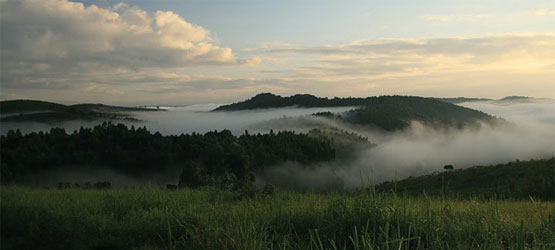A Forest for the Trees
There is an African proverb that says, “The best time to plant a tree is 20 years ago. The next best time to plant a tree is today.”
Mutuma Marangu ’84 understands this proverb on many levels. He is a forester, with an MBA from Wharton and a background in non-renewable energy, and is currently a director and major shareholder at Green Resources AS, a forestry, renewable energy, and carbon offsets company.
Green Resources, in fact, is the largest afforestation company in all of Africa (afforestation refers to planting forests where there were none before, such as in grasslands or degraded agricultural land).

Mutuma’s work with Green Resources brings him back to his roots and makes him a third-generation forester, a legacy inherited from his grandfather.
Green Resources presently owns some 23,000 hectares of forest, which it has planted since 1995, and another 300,000 hectares of land for future planting with pine, eucalyptus, teak, maesopsis, and a variety of indigenous trees. That’s an area larger than the state of Rhode Island. Green Resources has more of its forest plantations certified by the Forest Stewardship Council, a leading authority in the world on sustainable forestry, than any other African company, and is working to have all its forest plantations certified.
Some of the company’s plantations will make forest products—charcoal, wood pulp, transmission poles, building lumber. (Sao Hill Industries, owned by Green Resources, operates the largest sawmill in East Africa.) Others will provide materials for biofuels. But a core component of Green Resources’s business model—and a unique one, given the company’s status as a forestry outfit—is an emphasis on generating marketable carbon credits through forestry carbon offset projects.
The idea of a forestry and biofuels company undertaking large-scale carbon banking may seem counterintuitive, considering the fact that the forestry industry is sometimes thought of as a source of carbon emissions, not carbon offsets. But researchers recently calculated the net carbon footprint (emissions versus offsets) of Green Resources, and found that the company’s carbon removals from the atmosphere were seventeen times that of its carbon emissions, and Green Resources estimates that it may generate upwards of 30 million metric tons of carbon offsets over the next ten years.
“It’s a very low-cost, but effective concept,” Mutuma says of afforestation, the company’s chief forestry strategy. “We’re transforming rural environments which will become incredibly valuable within their lifetimes, and we’re doing job creation one seedling at a time. We see this as an all-win situation.”
Indeed, Green Resources’s afforestation efforts pay a variety of dividends: fostering economic development and employment in rural areas, combating soil erosion, conserving water, just to name a few. And the company is doing so through a for-profit business model. “Africans are like the rest of the world,” says Mutuma. “We live in a capitalist society, with a capitalist world order. The reality is that enlightened for-profit enterprises focused on the next generation can be extremely powerful and transformative in many positive ways.”
Green Resources certifies its carbon offset projects via the Verified Carbon Standard, a leading oversight group in the voluntary international carbon credit market. Certified credits are then sold via the London-based CarbonNeutral Company, which acts as a vendor, of sorts, to companies interested in offsetting their carbon footprint.
Those are the details, but Mutuma also has a talent for seeing the “big picture.” He says that Green Resources’ work with carbon credits and afforestation serves more than the environment. It serves people. “Better health care, better livelihoods, better education, better future prospects. My belief is that that happens by planting trees,” he says. “My whole view on this issue is, you wait for people to wake up, and if you’re doing the right thing, people will ultimately move toward you.”
